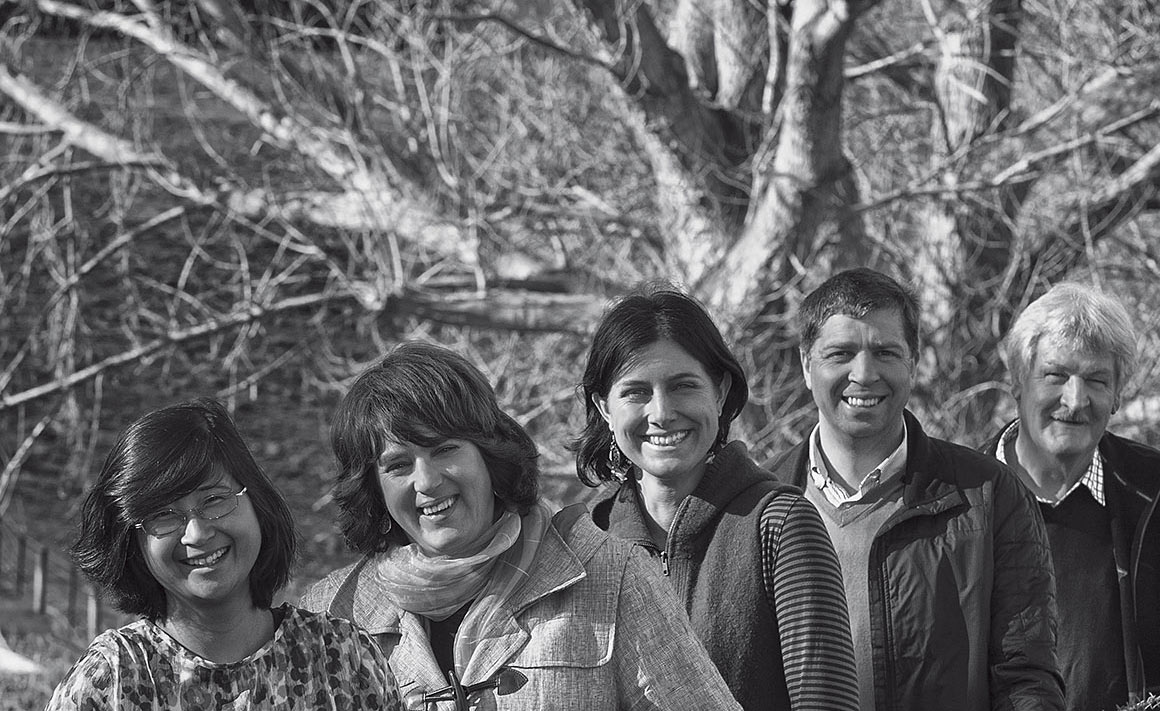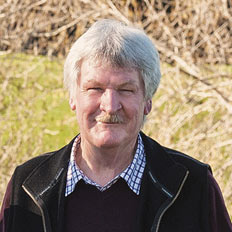 Monday 3 February 2014 11:39am
Monday 3 February 2014 11:39amThe Agriculture at Otago Research Theme aims to enhance New Zealand's agricultural productivity, add value to our primary products, while also promoting sustainable and profitable environmental management.

Farmers are often praised for their contribution to New Zealand's economy – and often pilloried for contributing to the degradation of the country's environment. One of Otago's newest research themes aims to help them achieve the twin goals of improving profitability and reducing environmental impact.
Agriculture at Otago draws on the University's long history of scientific strength in plant and animal production, food and health, and sustainability.
It's headed by Emeritus Professor Frank Griffin, who has recently retired from his 43-year career at Otago to be Director of Disease Research Limited (DRL) at AgResearch's Invermay facility in Mosgiel.
As one of the University's Otago Innovation companies, DRL benefits from linking academia with industry, providing scientific solutions to practical problems.
“We take a pragmatic view to solving things in New Zealand,” says Griffin.“We're not looking for a single way to solve all the problems in one go. You won't find it. But we aggregate common sense from a number of sources to provide simple solutions that solve complex problems.”
DRL started life in 1985 as the Deer Research Lab, where Griffin was investigating the practicalities of farming captured wild deer, studying stress-related animal disease.
A decade later DRL diversified and became the Disease Research Lab, using its accumulated skills to support the release of captive-bred animals into the wild, such as Saudi Arabia's efforts to re-establish a natural population of oryx.
DRL also developed vaccines and laboratory techniques to diagnose tuberculosis (TB) in deer and paratuberculosis (Johne's disease) in cattle, deer and sheep.
“TB and Johne's disease are now both largely under control,” says Griffin. “A peripheral benefit from these studies was the identification of genetic markers that distinguish between animals that are resilient or susceptible to infection.
“We're constantly exploring new innovations and, if we do it properly, we make ourselves redundant, which is a sure sign we've succeeded.”
For every success and planned redundancy, Griffin's team found new challenges and now the latest iteration of DRL is thinking big with Agriculture at Otago and the backing of the whole University.
“New Zealand works with domestic livestock better than anywhere else in the world and Otago is the logical point of call for agri-based research. We want to capture and consolidate the very diverse research initiatives at Otago and help researchers to connect with a range of industries in the primary sector.
“The idea is to develop a coherent research engine so we can apply for funding for research based on practical needs. We'll be listening to industry groups to find out what they want and work out what they really need. We want to know their issues and see if we can fill any knowledge gaps they have.
“It may be as simple as using existing knowledge or translating new research findings into solutions for real world problems.
“We're talking with generic and global groups and already working with organisations such as food production companies and Beef and Lamb New Zealand – places where we can make a contribution.”
The stakes are high.
“New Zealand is really one big farm,” says Griffin. “Problems with disease control or biosecurity could be disastrous. The introduction of foot-and-mouth disease could cost the country $10–20 billion. We need to sustain our products being contaminant-free and remaining free from disease.”
One of the latest research initiatives involves seeking ways to turn infections into vaccines, manipulating the host response to fight infections, just as human cancer treatments have become more focused.
“New Zealand has a reasonable investment in human health and we are doing the same with agribusiness,” says Griffin, whose early academic career investigated reproductive immunology in humans and animals.
“With new immune therapies, human testicular cancer survival rates have gone from 5% to 40%. It's possible we can use the same approach with parasites by turning infection into a 'vaccine au naturale'.“
Agriculture at Otago 's three broad aims are to enhance agricultural productivity, add value to primary industry products, and help manage the environment sustainably and profitably.
“We are always looking for ways to do jobs more efficiently and get more for less.
“We also want to enhance and add value to food products. Just as we started looking at food and nutrition, we are now looking at the interface of food and health promotion and the connection between food and medicine.
“Questions surrounding the environment really interest me. We're now looking at traceability and identifying healthy and unhealthy soils because dairying is not just changing the face of the New Zealand industry – it's also changing our soils.
“We have to develop new ways of coping with these changes to maintain a sustainable environment that is profitable. We're looking for common-sense solutions and working with all the groups involved to make science come alive in that sector.”
Griffin emphasises that Agriculture at Otago aims to encourage collaborations. “We're identifying partners and providers. At this stage we're making progress with some large groups. It can take years to establish confidence and relationships but when you have them you keep them for life.”
As an Emeritus Professor, Griffin maintains his University connections despite the move of DRL to Invermay.
“We are autonomous, but still linked with the University, which is a privilege and gives us credibility – and we keep our research mission, which is absolutely vital.
“We are continuing to interface with the primary sector and are bringing the University and AgResearch into the loop, which offers new opportunities to all involved.”
DRL's physical move from the Department of Microbiology and Immunology laboratories was seamless. “Invermay has fantastic facilities. We've worked closely with them since 1985 and had amazing access to animals and technical facilities.
“It's a great joy to be able to continue to work on what I've been doing for the past 40 years, and it's a privilege to be able to add some value.
“It's also a great new opportunity for Otago, where we have wonderful science and where we can align with key players and take our science into the real world.”
Funding
- DEEResearch
- NZDFA
- AgMardt
- University of Otago
Genetics potential
Plant molecular geneticist Associate Professor Richard Macknight splits his time between academia and industry, with roles in the Department of Biochemistry and Plant and Food Research Ltd.
“Agriculture at Otago is hoping to increase the basic underlying research into a wide range of different things that contribute to productivity in agriculture. My research is trying to understand how to improve crop plants through genetics."
“We're aiming to understand the genetics of different agricultural traits so we can give breeders the information they need to improve varieties by including the traits they want.
“Lots of new technologies are coming in, such as genome editing, which is really exciting and something that can be used in all sorts of applications – even potentially correcting some genetic diseases in humans.
“Using this technology in plants, we should be able to edit a crop plant's genome to give it a characteristic that isn't normally found in that crop but exists in other plants – like being able to survive a drought. That's where the real excitement is in our field.
“Research at Otago is very strong in genetics and the use of new sequencing technology so it's those skills that Agriculture at Otago researchers can bring to a broad range of agricultural problems.”
Funding
- University of Otago
- Marsden Fund
- New Zealand Onion Industry
Adding value
Botany alumna Dr Anna Campbell is managing director of Dunedin agri-technology company AbacusBio, which aims to bridge science and business to improve agricultural systems and food products.
“We are at the applied end of science. A lot of traditional R&D focuses on the research end. We tend to focus on the development end, which is just as important for the uptake of research by industry. You have to understand commercial drivers.
“Agriculture at Otago's challenge is to grow relationships with industry and get a feel for what industries want so we can better solve their problems.
“We want our main collaborators to be some of the key exporters in New Zealand – not just large companies, but also small innovative firms. We have to make sure that what we are developing can be used by them to add value to their products or improve productivity.
“For the future of agricultural exporting, everything we sell has to be underpinned by data and science for our products to be in demand by premium customers."
“I'm passionate about agriculture. There's nothing more satisfying to me than seeing your work used from product production to its endpoint. It's really exciting to be making a difference and it also shows that academia is not the only route to a satisfying career in science.”
Funding
- Callaghan Innovation
Better and tastier
Professor Indrawati Oey, Head of Food Science, is developing new technology strategies that use pressure and electric fields rather than heat to process food, making it healthier, tastier and more environmentally friendly to produce.
“We want to retain the stability of bioactives and the sensory properties of foodstuffs, and are developing smart processing strategies to do this by combining extremely high pressures or electric fields with temperature.
“This new process is more energy efficient and uses less water, so it is technologically green while still adding value to raw materials.
“We are working as a technological bridge between primary industry's raw materials and marketability, aiming to provide better value and prolong high-quality shelf life for products.
“Primary industries are the backbone of the New Zealand economy. They need to transition from volume commodity production to customised, branded value-added products and we are poised to help them to do that."
“By co-ordinating the University's crossdisciplinary strengths, Agriculture at Otago can create a one-stop shop, providing service and advice to the agricultural sector.
“By working together we can raise the profile of the study of agriculture at Otago – and we have already made a start.”
Funding
- Ministry of Business, Innovation and Employment
- Food industries
Sustainable balance
Dr Miranda Mirosa (Food Science) brings social sciences to Agriculture at Otago, investigating consumer demand and how to provide for it sustainably.
“Environmental management involves many disciplines working on understanding the relationship between biophysical environments and humans and their activities.
“I focus on the consumer end, looking at how trending demands for natural and green products are impacting on environmental standards and how food is produced and used.
“With 9.6 billion people forecast to be on the planet by 2050, we have to increase food production, but there will be limited availability of land and fresh water. So there will have to be lots of different solutions to increasing production in a sustainable manner."
“Part of managing the problem is reducing waste because we know that globally between 30 and 50 per cent of food produced is not eaten.
“We also know agriculture is greenhouse gas intensive from a land use point of view and that there is damage to waterways – but we need to maintain our clean, green image to sell the agricultural products that are so vital to New Zealand.
“It's incredibly important to find a balance. Bringing the resources of so many different parts of the University together is one of the ways to do it and I'm very excited to be part of that.”
Funding
- Post-harvest Loss and Food Waste Research Fellowship
- Ministry for Primary Industries
- Ministry of Business, Innovation and Employment